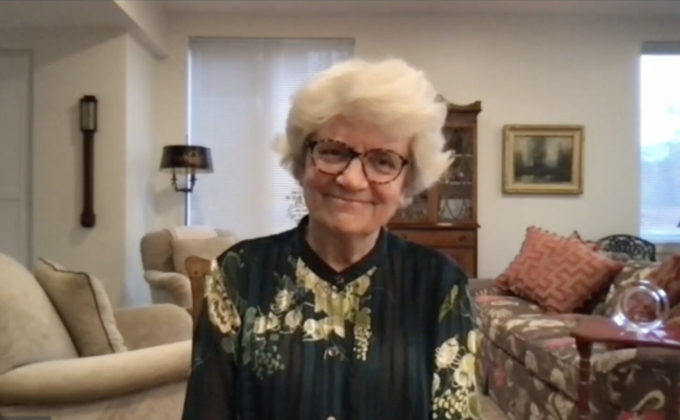Nancy Hopkins, recipient of the 2021 STAT Biomedical Innovation Award, speaks with STAT’s Matthew Herper. STAT
READ STORY ORIGINALLY PUBLISHED AT STATNEWS.COM
By Isabella Cueto Nov. 16, 2021
Nancy Hopkins, an MIT professor who has made significant strides in molecular biology and a tireless advocate for gender equity in science, was named the recipient of STAT’s 2021 Biomedical Innovation Award on Tuesday.
“It’s very easy to forget how much progress there has been because we haven’t arrived where we’d like to be. So we see the problems that still lie ahead. But you periodically have to pause and say, ‘Oh, my gosh, look how far we came,’” said Hopkins at the 2021 STAT Summit, where she was honored for her work. The STAT award, now in its third year, honors biology and medicine researchers whose work has helped define their field. Hopkins was selected by STAT editors with input from outside experts, and received the award during the annual STAT Summit, a three-day event focused on health care. She is the second woman to receive the award, which was given last year to CRISPR researcher Jennifer Doudna.
“We’re in a period of dramatic advances and daunting problems,” said Matthew Herper, STAT’s senior medicine writer and editorial director of events. “Society needs every great scientist we can train. And that means that we need women every bit as much as men. Hopkins’ advocacy in this area has been instrumental in starting to create a more level playing field — a project on which there is still much to do.”
“I thought it was a choice, once the door opened,” Hopkins said. “And I think we were all surprised to discover that behind the door that had opened were a whole series of obstacles that we really hadn’t thought about.”
Over time, her illusions faded so all she could see was a perplexing problem. So she did what any good scientist does: She studied it. She surveyed female colleagues about their experiences at MIT and then went big, chairing a committee that produced landmark reports exposing gender-based discrimination, structural sexism, and pay disparities across MIT departments.
But unlike some work that emerges from higher ed committees only to languish in a file cabinet, the committee’s work forced MIT administrators to confront reality by making the gender inequity issue in each of its schools front and center. In response, deans and provosts aggressively recruited women for faculty positions, opened an on-campus day care and fixed pay gaps — treating the problem as a structural issue instead of a case-by-case situation. The findings were highlighted in the media, prompted other institutions to interrogate themselves, and sparked conversations about pervasive discrimination against women in the world beyond academia.
“If one were to ask what was the most important factor in change to date, it would have to be the Reports that documented the problems and led to the engagement of administrators in solving them,” Hopkins wrote about MIT’s progress in a subsequent report.
Hopkins has continued to push for the inclusion and recognition of women in science, technology, engineering, and math fields. As a biology professor and researcher, she watched the biotech industry be born and boom — and saw how women were systematically excluded from it, barred from contributing their expertise. So Hopkins worked with MIT’s Sangeeta Bhatia and Susan Hockfield, and co-founded the Boston Biotech Working Group to foster women faculty as founders and board members of biotechnology companies.
While working to make science a viable career for more women, Hopkins was also doing groundbreaking genetics research. As a young scientist, she focused on identifying RNA tumor virus genes and unraveling how they were correlated to the severity of cancers. She turned her attention a decade later to a different study of cancer, becoming one of the first scientists to use zebrafish as a model to understand how genetic mutations contribute to the development of diseases such as cancer. What started as an attempt by Hopkins to switch fields in search of a more equitable department led to major scientific breakthroughs, even though she was denied adequate space and resources for her zebrafish work.
“Social change is a fascinating thing,” she told STAT. “Why does it take so long? We’re changing people’s brains. I think these unconscious biases are so deeply embedded in our brains. Why did it take me 20 years to figure out what was going on? … You come in with the belief that science is a meritocracy.”
Hopkins is a member of the National Academy of Sciences and the National Academy of Medicine, and has also been awarded the Harvard Centennial Medal, UCSF Medal, and MD Anderson’s Margaret L. Kripke Legend Award, among other honors. She is a 2021 fellow with the American Association for Cancer Research Academy.
See more stories celebrating MIT’s most innovative women
EXPLORE OUR INCLUSIVE INNOVATION EFFORTS |

